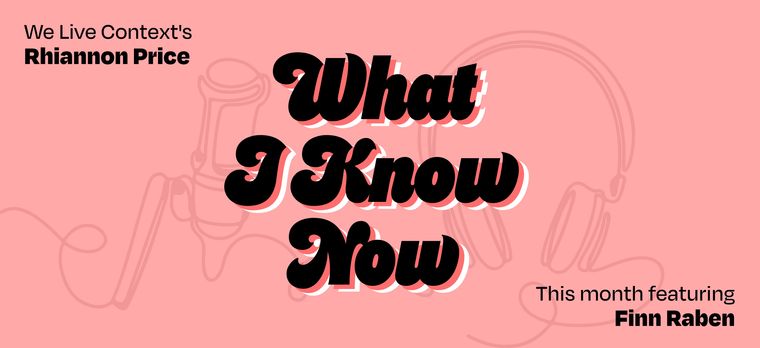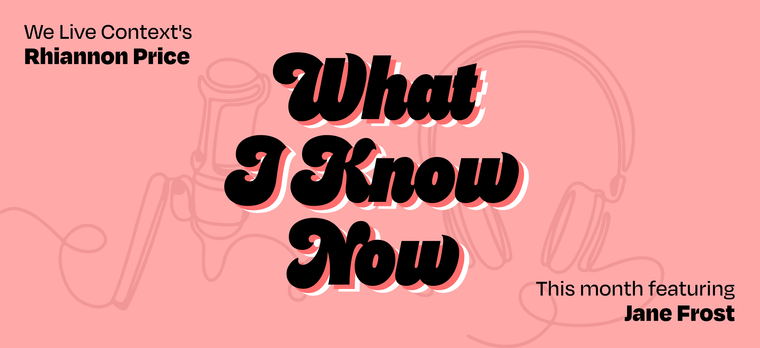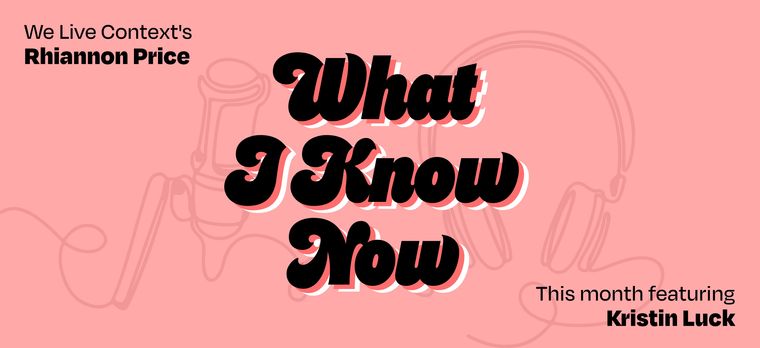What I Know Now... Joanne Pearson
Each month, We Live Context’s Rhiannon Price asks some familiar faces in the MRX world what they have learned about themselves and the industry on their journey so far.

I’m lucky enough to have interviewed some super interesting people throughout my career. People from all over the world. People from all types of professions. People from many different backgrounds. I’ve spent days in their company taking it all in. I’ve seen them laugh, cry, and get angry about the twists and turns their path has taken them on. Be it a South African entrepreneur in Soweto or a Saudi millionaire, I have learned a lot about how people get to where they are going and their advice for life. But until recently, I have never really turned the lens inward. I have never asked my peers or the people I most admire in market research what their advice for life is. How they got to where they are. How they see things. But when I did, I found it wonderfully inspiring and not only a little bit transformative.
And so, I thought it was about time that we celebrated the wisdom of our MRX crowd and let their stories inspire us.
This month I spoke to Joanne Pearson, Global Customer Insight Director at Jaguar Land Rover, who told me about the importance of embracing change, speaking up in meetings and her passion for supporting other women and minorities in business.

Let’s start like we mean to go on with the “big one at one”…Are you where you thought you would be at this point?
No, but not in a negative way, just because I never had a plan. I went into a graduate job and discovered the most exciting place to be was marketing. I then stumbled into customer insight and realised that was a brill place to be. But actually, when I look where I am now and think about where I've come from, I'm delighted. So yeah, tick!
Why is it a big tick?
Well, I've loved all the jobs I've done. I’ve managed to find companies and categories I could be passionate about. And getting to a senior level, having a seat at the table and being able to influence things and really make a difference. And of course having the privilege of leading teams.
Was leadership always something you were gunning for?
I wouldn't say gunning for, but when I look back and think about it, when I was 18 - the summer before I went to university - I worked at a play scheme run by the local authority, out of local schools. I got a job as a leader. I wasn't even studying to do anything in the teaching space and I certainly didn't have any sort of qualifications for it. But for some reason they asked me if I would I lead. So I was responsible for staff and I had enough children to load a bus to take them to Twycross Zoo. I remember that day vividly thinking, “Oh my gosh, I am totally responsible for all these children!”.
So, I guess, from quite an early age somebody saw something in me. And obviously I relish the opportunity to do it, albeit being slightly scared of the level of responsibility I was being given for lots of people's children at that age!
So, as you have gone through different leadership positions in your career, is there still a fear factor or have you got to a position where you feel completely confident in what you're doing?
I don't think I have any fear. I started leading teams in my 20s when I went to my first main employer, and I've led teams ever since. One of the reasons I love customer insight is because I love understanding people. And nurturing, supporting, coaching and developing people has been really important for me throughout my career. So actually leadership is one of the elements of the job that I get an awful lot out of.
You mentioned that you stumbled into market research. That is a common way in, even now. Can you tell me more about that?
I did a business degree with technology. So I did lots of subjects. And there was probably a marketing methods module or something, but it was when I actually joined my first employer Barclaycard that I got into it. I spent my first eight years pretty much doing product management and new product development, which was really exciting - creating new products for a company that had a really tiny portfolio of products. And I used a bit of market research as part of that. That’s when the stumbling really happened as the CMO at the time wanted someone to take on the customer insight function and asked me if I would do it. So I said “Yeah, happily. I’ll give it a go!”. And I found I actually I really loved it.
So the question I ask everyone…have you ever doubted you're in the right career?
Have you ever looked outwards or sideways and thought ‘what if’?
No, because I've always been having too much fun! The only thing I have ever thought is that I don't want to work for the same company for my whole career. I could have easily spent my whole career at Barclaycard and, in fact, before I knew it I'd clocked up 10 years. And, when you hit ten years, or any significant milestone, they sent you a letter from the chairman and a brochure to pick something. That was a seminal moment for me because I could look around and see lots of people who didn't want to be there, but they were there because they had great pensions and discounted mortgages. And I thought that's no reason to stay, and also I wanted to experience other categories. I didn’t want to spend my whole life in financial services and the longer you're in a category, the more difficult it is it is to move. So, what was meant to be the chairman congratulating me and rewarding me for my loyalty, actually had the complete opposite effect. And within a year I was gone.
So, now then, what is most important to you? What gets you out of bed every morning and makes it feel like it's all worthwhile?
I feel like we're at the centre of things. We do research for the whole company. So, you know, it can be something strategic, something customer experience or brand related, a feature within a car or a whole product. We get involved in everything. I like being at the heart of the business. And everything we do is to influence change.
Why do you think that's so important?
Nobody wants to stand still. And I guess regular and consistent can quickly become boring, whereas when it’s constantly changing, it's exciting.
I don't want to make it a gender conversation, but it's hard to talk to someone who is as accomplished as you are and is a female in the business world, without asking if there is any wisdom you can pass on about navigating that?
Yes. Support other women. In all three categories I've worked in, the more senior you are, the less women you see. When I came to Jaguar Land Rover, it wasn't just coming to automotive where it felt male dominated, Barclays and Vodafone also felt male dominated and it hasn't been unusual for me to be the only female in the room.
But also, there’s just a lack of role models. So, supporting the pipeline of women coming through becomes even more important because otherwise we'll never change that and women will forever be in the situations I've been in. And it’s so important we address that balance as we've got a population that is 50% male and 50% female, so that doesn't feel right.
I’ve done a lot of work over the last few years around diversity and inclusion, not just gender based, but many aspects. And I have a really strong belief that you can't be something on the outside that you're not on the inside. And if you want to truly understand your customer base – which is diverse - then it's much harder if you don’t have a diverse employee base because you've just got to work that much harder to understand your customer.
Navigating the DE&I space can feel intimidating for some people, have you got any learnings or advice from all the work you've done in that area?
I left Barclays in 2004 but I remember in the late 90s Barclays setting up employee led networks - I think there were five of them at the time representing gender, sexual orientation, age, ethnicity and disability. And that was really progressive for the time. Then at Vodafone I went on to do lots in the DE&I space and saw them win loads of awards for it. JLR were a bit later to the party, but now I think we've got 14 networks and I make sure I've joined them all. I have helped develop the communications that are designed to educate everyone in the business around allyship and why it's important.
I think the main thing is not to be held back by fear. Ask questions. Have the conversation. Make an effort to be an ally, and then that fear goes away because actually you can learn and everyone's learning in many of these spaces. It’s still new in a lot of companies, people are just trying to be more diverse and inclusive and just make things more equitable.
As we are touching on your involvement beyond the day job as it were, let’s talk about your role on the MRS Senior Client Council…
I've been on it a number of years. My motivation is that I do feel part of the industry and I want to represent the automotive industry as we are a bit different. Some of our challenges, our business models and actually how we do some of our research is different. And the fact we are a premium, global brand means there are different perspectives I can bring to that conversation.
And the great byproduct for me is I get to network with people who don't do jobs like I do. I get to have conversations about topics that I'm grappling with – like DE&I and AI – and get external perspectives on that.
It's clear you have a lot on your to do list, have you got any techniques and ways of getting stuff done you can share?
Yes, don’t expect to be involved in everything or know everything. We have a team for a reason! My role is to coach and develop the team. To remove blockages and set a good direction for what we're doing. And then, step back a bit really and empower the great people we have to do what they do best. It benefits them, but it also means I can free up a little bit of time to do the other things I'm passionate about, like the MRS Client Council and the DE&I work within JLR. And of course, to have some sort of semblance of work/life balance – to be there for the children and do things like fitness that I enjoy.
Do you even experience Imposter Syndrome?
It's interesting because Imposter syndrome has been around for a while, I think it was coined in the late 70s as a phrase, but I don't think I have ever felt it. That said, I think all women coming back from maternity leave feel like everything will have changed and that they’ve maybe lost the ability to work and function on a business level. That’s really natural and I felt that. On both occasions I also came back to new bosses as well, which is even more difficult because you actually haven't proven yourself and so you feel even more pressure.
But no, I don’t feel Imposter syndrome in general. It’s too strong for any of the feelings I've felt. I'm employed to be a specialist within this company and remembering that I’ve actually been chosen to do this job gives me confidence. Obviously, I pay attention to feedback and have a radar of how it’s going. But you have to be confident that you're bringing something that other people can't, or won't, bring into the business.
It's a bit like whenever I coach anybody on presentations, which is something lots of people get nervous about. I always tell them to remember that nobody knows what you're going to present. So you can't get it wrong. If you forget something, no one will know. We are often too hard on ourselves and I've got loads of these little mottos that I either tell myself or other people.
Ooo can you give me some more?
Well, one of them is, what's the worst that can happen? I think we can imagine things are worse than ever. But, you know, even the worst thing you can think of, like, “oh, maybe I'll get fired”, means you’ll just go on to do something even better. But of course, that worst thing is unlikely to even happen.
It's interesting because the more I talk to people, the more people have said that they’ve done stuff that was maybe the wrong move, but they don’t regret it. But rather, ‘that was an interesting decision I made!’ Are you someone who deals in regret?
I don't dwell on things too much. I've probably got one which was a really significant for me. It was Barclays, early in my career, and they were planning to go through a really significant change and so they brought in quite a lot of consultants to inform this change. I remember not reacting in the most positive way, when really I could have embraced that differently. I'm glad it was early in my career because in all the years I've been working, I've seen lots of similar situations where consultants have been brought in and I've always embraced that as a positive opportunity for the business to change.
You’ve already mentioned some advice you give your team members, do you have any other advice that you have bottled over your career?
Don’t be too quiet in meetings! I’ve been told a number of times throughout my career that when I speak, people really listen and that I’ve got great things to say, but that maybe I don’t speak up enough. Some of that was because many of the rooms I was in, I didn't look like anybody else. I didn't feel like anybody else and maybe I had a different view. But also, part of it is that I'm not the sort of person who will speak for the sake of speaking. I'm happy to let others speak. And then if there's something that hasn't been said or I disagree with, then of course I'll step forward and speak.
I tend to tell my team that if you haven't said something in the first five minutes of a meeting, it's way more difficult to get in and say something. So, for people who find it more difficult to contribute or get their voices heard, my advice is to set yourself a challenge and speak in the first five minutes.
Let’s talk about what you to outside of work that helps you grow and makes you feel fulfilled…
Sports. Well, family and then sports! Tennis is my number one passion. And I swim to keep everything supple and in good working order, but it's also quite relaxing and a good time to think. So when I do swim, it's mostly first thing in the morning and I can process my day or things that I need to think about or solve. I was a swimmer as a child and swam competitively, so I can swim well without much effort.
So, are you a competitive person - do you enjoy the competitive side of stuff?
Yes, but for example, with tennis I play doubles so I'm competitive in that I want to win, but I also don't want to let my partner down. That's as much of the motivation, really, not letting other people down.
And finally, to end the conversation, some quick fire recommendations.
If you read just one book?
The late Michael Mosley’s book on gut health. I've always been a healthy eater, but what I've learned through reading that is fascinating. Everyone should read it.
If you listen to just one podcast?
Steven Bartlett’s The Diary of a CEO. And the Davina McCall one around life and the menopause.
If you follow just one person?
I've always liked Caitlin Moran. She’s always funny in the moment and quite topical.
And if you remember just one thing?
What’s the worst that can happen?!


